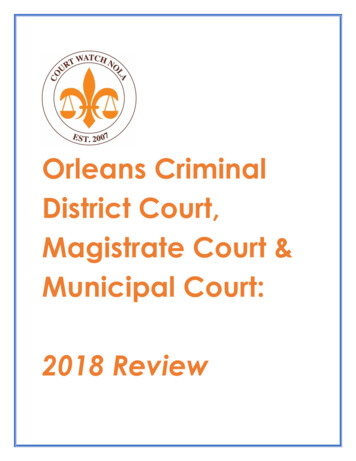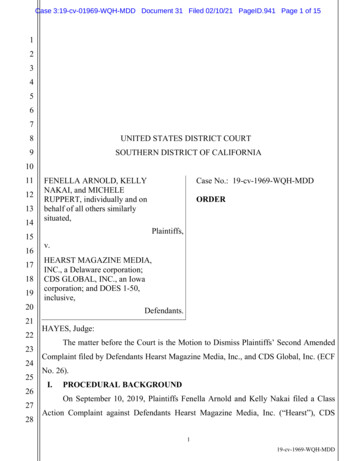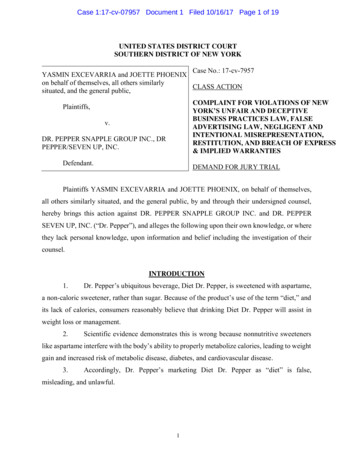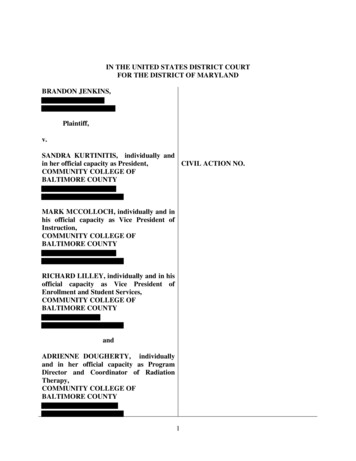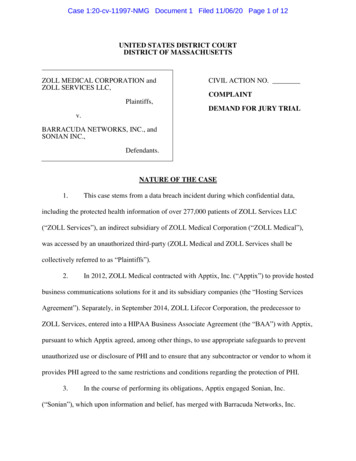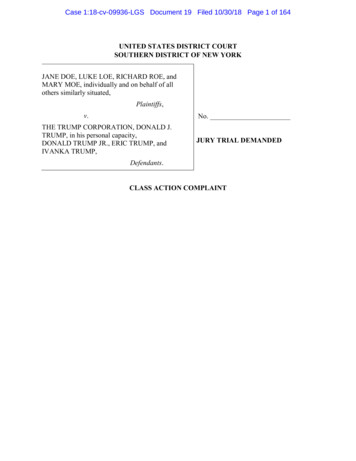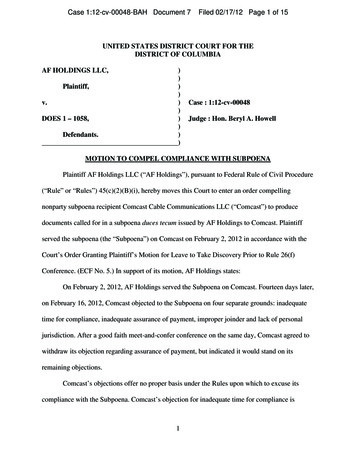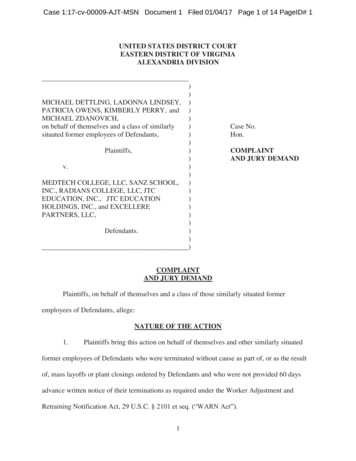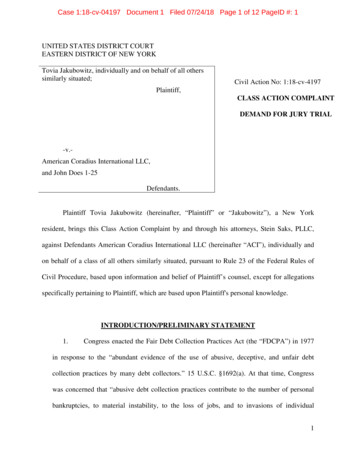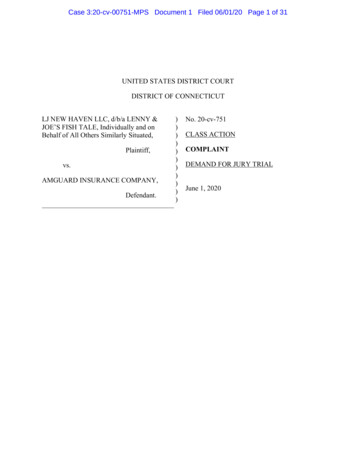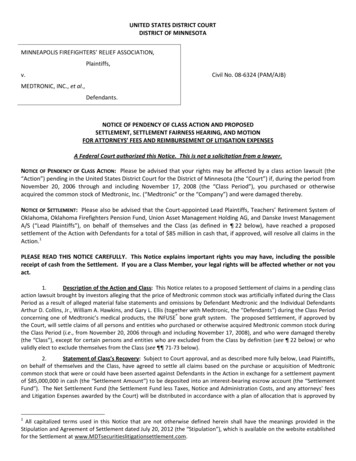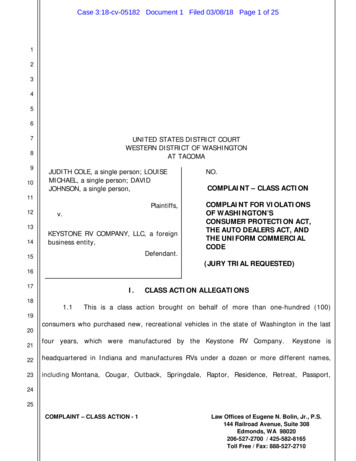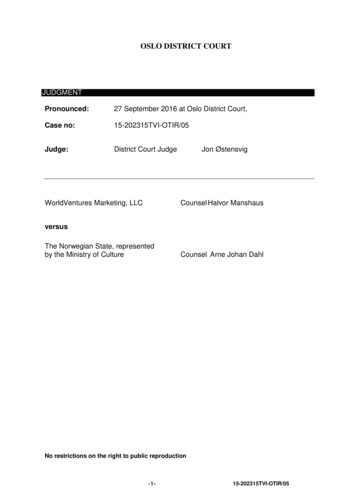
Transcription
OSLO DISTRICT COURTJUDGMENTPronounced:27 September 2016 at Oslo District Court,Case no:15-202315TVI-OTIR/05Judge:District Court JudgeWorldVentures Marketing, LLCJon ØstensvigCounsel Halvor ManshausversusThe Norwegian State, representedby the Ministry of CultureCounsel Arne Johan DahlNo restrictions on the right to public reproduction-1-15-202315TVI-OTIR/05
JUDGMENTThe case concerns the validity of the Norwegian Gaming Board’s administrative decision of24 November 2014, which did not grant an appeal against the Norwegian Gaming andFoundation Authority’s administrative decision to order cessation of parts of the plaintiff’sactivity in Norway. The case concerns in particular the question of whether the plaintiff’sactivity was in contravention of the prohibition on pyramid-like sales schemes laid down inSection 16 second paragraph of the Norwegian Lottery Act.1Background to the caseThe plaintiff – WorldVentures Marketing, LLC (WorldVentures) – is a US-registeredcompany in the WorldVentures Group, based near Dallas in the USA. WorldVenturescurrently conducts business in approximately 30 countries, with more than 700 employees andseveral hundred hired consultants. A key part of the business consists of selling membershipsin DreamTrips, which on the company’s website is referred to as a ‘vacation club and lifestylecommunity’. Members of DreamTrips have access to buying holiday trips from WorldVenturesthat are specially designed by that company, and they also have access to some other servicesand products. Members pay USD 199.99 on joining and a subsequent monthly fee of USD49.98, in the following referred to as membership fees. The membership is not subject to anylock-in period or notice period. In Norway, general rules on cancellation periods are alsoapplicable. Worldwide membership is stated to have been approximately 100,000 at the startof January 2013 and approximately 430,000 in May 2016.Membership is not bought directly from WorldVentures. The company has linked up with agreat many independent dealers and sellers who sell membership in DreamTrips directly toconsumers, i.e. without using traditional sales channels. The sellers pay USD 99.99 on joiningand a subsequent monthly fee of USD 10.99, in the following referred to as representativebusiness system (RBS) fees. The sellers can recruit an underlying pyramid-structured salesorganisation. The sellers get a commission from WorldVentures based on their own and theirsubordinates’ sales of memberships, as regulated in more detail in a compensation plan. Theydo not get a commission based on the RBS fees paid by subordinate sellers. The businessmodel for selling memberships is thus based on network sales or multi-level marketing(MLM). Many of the sellers have also bough membership in DreamTrips themselves.WorldVentures has conducted business in the USA since 2005, and started its business inNorway in 2010. Based on queries concerning the company's activity in Norway, theNorwegian Gaming and Foundation Authority (the Gaming Authority) initiated a supervisoryprocedure in spring 2013. The Gaming Authority wanted to clarify whether the activity was incontravention of the prohibition laid down in Section 16 of the Lottery Act. The GamingAuthority prepared the case by obtaining information and documentation about the activity. Ameeting was also held with WorldVentures, and correspondence took place with the-2-15-202315TVI-OTIR/05
company’s attorneys.Based on a supervisory report dated 19 February 2014, the Gaming Authority gaveWorldVentures advance notice of an administrative decision pursuant to Section 14a of theLottery Act to order cessation the sale of memberships, RBS participation and related products,because the scheme was assumed to be in contravention of Section 16 second paragraph of theLottery Act. WorldVentures contested that this was the case, but the Gaming Authority upheldits assessment and, on 30 April 2014, it adopted an administrative decision pursuant to Section14a of the Lottery Act, with the following conclusion:‘All sales of memberships, RBS participation and DreamTrips products to participantsin WorldVentures in Norway must cease, because they are in contravention of Section16 second paragraph of the Lottery Act.’WorldVentures appealed the decision, and the Gaming Authority decided to deferimplementation on certain conditions pending a decision in the appeal case. The GamingAuthority’s administrative decision was upheld by the Gaming Board in a decision of 24November 2014. According to the information provided, WorldVentures subsequentlycomplied with the order.WorldVentures submitted a petition for a preliminary injunction, but the Office of the ChiefCity Judge of Oslo did not grant this petition in its ruling of 2 January 2015. On 23 October2015, WorldVentures sent a notice of its intention to bring legal action and a claim for reversalof the administrative decision to the Gaming Authority. It appears that this was forwarded tothe Ministry of Culture with a copy to the Gaming Board, without the claim for reversal beingexpressly considered.The District Court received WorldVentures’ notice of proceedings against the State representedby the Ministry of Culture on 17 December 2015, in which it entered a claim for the decision ofthe Gaming Board to be declared invalid, alternatively that it be repealed in whole or in part. Inits notice of intention to defend of 18 February 2016, the State entered a claim that judgment bepronounced in its favour.The main hearing was hels in Oslo Courthouse during the six days from 15 to 22 August 2016.The parties attended with their respective counsel, and WorldVentures was also represented bya co-counsel. WorldVentures was represented by the head of the group’s legal department,while the State was represented by two senior advisers from the Gaming Authority. Fifteenwitnesses gave evidence, including the aforementioned representatives of the parties, and casedocuments and other evidence were presented as mentioned in the court records.When asked by the judge, the parties confirmed that WorldVentures Marketing, LLC is thecorrect plaintiff; re the general reference to WorldVentures in the administrative decisions, andthat the plaintiff was WorldVentures Holding, LLC in the case submitted to the Office of the-3-15-202315TVI-OTIR/05
Chief Judge of Oslo.2WorldVentures Marketing, LLC’s statement of claim and argumentsWorldVentures submitted the following statement of claim at the main hearing:1. Principal claim: that the Gaming Board’s administrative decision of 14 November 2014be declared invalid and without effect.2. Alternatively, that the Gaming Board’s administrative decision be repealed in whole or inpart to the extent that it goes further than there are grounds for.3. In any case, that the State be ordered to cover the full costs of the case for WorldVenturesMarketing, LLC.In brief, WorldVentures argued as follows in support of its statement of claim:The administrative decision was based on incorrect application of law, incorrect andincomplete facts and assessment of the wrong issues.The Court shall review all aspects of the decision. There is no basis for reluctance on the partof the Court to review the Gaming Board’s assessments. The facts of the case at the time whenthe decision was made are decisive; such, however, that factual evidence can be presentedsubsequently to clarify the situation that prevailed when the decision was made.WorldVentures is engaged in the sale of membership products in the form of network sales/MLM, and is otherwise like any other business. The sellers get their commission from the saleof products, which in turn are the result of significant investments and labour. This is real andsustainable economic activity and not a camouflaged pyramid scheme that falls under thescope of the Act. The purpose and result of the scheme are to generate profits by selling realservices for which there is a demand and not by getting new participants to invest at thebottom of a pyramid structure.Section 16 second paragraph of the Lottery Act is based on the Unfair Commercial PracticesDirective and what is known as the ‘Blacklist’. It is not permitted to set further conditions suchas ‘market utility’ or a requirement for actual utilisation. Services and rights are productswithin the meaning of the Directive. The prohibition must be given a restrictive interpretation,and any doubt shall be to the benefit of the company. The prohibition shall apply to thegrossest cases only, and WorldVentures' activity is nowhere near falling into that category.The interests of consumers are protected by other and less invasive provisions of the consumerlegislation. It is illustrative that Norway is the only country where WorldVentures' activity hasbeen prohibited. The administrative decision is based on misunderstandings and prejudicesrelating to MLM activities.One fundamental error in the decision is that the members and sellers – as well as the-4-15-202315TVI-OTIR/05
membership fees and RBS fees – are considered together. This entails a complete absence ofanalysis – and a fundamentally incorrect assessment and misunderstanding – of the businessmodel and revenue flows. This has resulted in a number of incorrect assessments in relation tothe conditions laid down by law. A more detailed analysis shows that dealers and membershave quite different roles, rights and obligations, even if many act in both roles. Thedistinction between the different groups and revenue flows is absolutely fundamental and it isactually and legally implemented in this case and fully transparent. That many people haveboth roles is of no consequence to the deliberations in the case and is, moreover, completelynatural in a business model based on direct sales. Furthermore, in foreign markets that havebeen allowed to develop, a relatively high number will be members only. Any overallconsideration of this must be based on the specific circumstances, which is not the case here;see Norwegian Supreme Court Report Rt-2009-661.Another error is the failure to consider and rely on the activity being sustainable, and not in thenature of a pyramid scheme that is pre-destined to collapse when new persons are no longerrecruited to pay contributions. The accounts show that there are sufficient revenue flows at alltimes to cover the dealers' commissions without members being recruited. When a memberleaves, the commission stops, and there is also an agreed cap on the commission. Lack ofsustainability is a fundamental condition for such a business even falling under the scope of theprohibition in the Act; see the ECJ’s decision in 4finance and Rt-2009-661.The Gaming Board’s assessment that a pyramid-like system exists is incorrect. The Board hasincorrectly considered members and dealers and membership fees and RBS fees together, andnot conducted specific assessments. As opposed to what was the case in Rt-2009-661, there areno grounds for considering these factors together in the present case. When consideredcorrectly and separately, it is clear that the members are not part of the company’s sales system,which is an MLM system and therefore has a pyramid structure when seen in isolation.No consideration is paid for the status of participant – neither by the sellers nor by the membersor the two together. Payments by members and RBS fees are incorrectly confused in theadministrative decision, and this is also not discussed further. It is overlooked that the RBS feeas a whole is paid to and kept by WorldVentures, and thus does not constitute payment forparticipant status and, in any case, not an overprice. As regards payments by members, nooverprice can be deemed to have been charged as payment for participant status.The sellers have no possibility of earning an income from other people’s payment forparticipant status. No consideration is paid for participant status; see above. Whichever wayyou look at it, the RBS fee accrues to WorldVentures, and the sellers do not get a commissionfor recruiting new sellers. A member never becomes a participant in the sales scheme, so thatcontributions paid by members are irrelevant in this context and cannot in any case be deemedto constitute contributions.-5-15-202315TVI-OTIR/05
The business’s revenues cannot in any case be ascribed to ‘specific’ recruitment. Concerningmembership fees, the consumers are willing to pay for such membership, and so it must beassumed that the payment corresponds to the market value of the membership. The Directiveand the Act stress that the sale or consumption of a product, service or other provision isrelevant. The Gaming Board’s point of departure is misconceived when it states that the valueconsists purely of the possible return of the member’s contribution in the form of discounts ontrips bought. The Gaming Board states incorrectly that reward points, the price guarantees andconcierge services have no value, and fails to consider the value of the online travel agency(OTA). The Gaming Board states incorrectly that WorldVentures has not documented the basisfor its revenues. Without conducting an independent assessment, the Gaming Board supportsthe Gaming Authority’s view that the sale of products represents no more than 5% of theturnover. It is an incorrect and much too narrow approach when decisive weight is given to theactual use of the membership benefits.The State is unable to explain how ‘less than 5%’ is calculated as revenues from the sale ofproducts. Based on the figures relied on by the State itself, the sale of trips represents 5.6%.Furthermore, it is not reasonable to use total revenues – both payments by members and RBSfees – in this context. The fact that reward points may be used for 90% of the trips has alsobeen disregarded.The Court must decide the market value of the membership – something that requires acomplex overall assessment. Decisive weight cannot be given to actual use or ‘market utility’.Use of the figures from 2012 is incorrect, because the figures would have been at the globallevel at the time when the administrative decision was made had it not been for the supervisoryprocedure. The time for assessing the value of the membership is the time of purchase, and thevalue that the product represents to the buyer at that time; ref. the witness Finpå. The price ofthe concierge service cannot be set to the procurement price for WorldVentures and it must beassumed to be of significant value for each individual member, regardless of the extent towhich it is actually used. The OTA is used and represents a real value. Members can orderreasonable trips, are offered a price guarantee and the possibility of simple online planning.The Gaming Board has also overlooked the real value of the membership, which enablesmembers to enjoy curated high-quality travel experiences, socialising with others, professionalfacilitation arrangements and a number of other elements. They are also given a Dream PricePromise and a price guarantee. Family members are included in the membership and can enjoymembership rights, and there is also a cancellation period and no lock-in period. It must beassumed that a membership paid by an employer would be considered a taxable benefit.An active member will quickly enjoy benefits that exceed the contribution paid. That passivemembers fail to avail themselves of these benefits does not reduce the value of theirmembership. The members get what they are promised in the marketing. A high membershipturnover is common to all subscriber relationships and is not a manifestation of low value.-6-15-202315TVI-OTIR/05
The overall assessment must be based on the cross-border nature of the business, and not onthe situation in Norway alone.The conclusion is that the administrative decision is invalid on grounds of incorrect facts andapplication of the law.Procedural errors exist that may have had consequences for the administrative decision; seeSection 41 of the Public Administration Act.The case has not been sufficiently clarified; see Section 17 of the Public Administration Act.The duty under Section 16 third paragraph of the Lottery Act does not relieve the authorities ofthe duty to clarify the case. WorldVentures has responded to all requests, submittedconsiderable amounts of documentation and actively sought to clarify the case and all aspectsof the scheme. The Gaming Authority incorrectly focused on the situation in Norway and theactual discounted purchases of trips only. Moreover, the duty set out in Section 16 thirdparagraph of the Lottery Act is limited to providing information to show that incomingrevenues do not fall under the scope of the provision, and WorldVentures has done that.WorldVentures did not receive adequate guidance on how to meet the duty of documentation;see Section 11 of the Public Administration Act. The Gaming Board did not make its ownassessments and has now acknowledged that several relevant factors were not understood orconsidered.Sufficient grounds were not provided for the administrative decision; see Section 25 of thePublic Administration Act. There are more stringent requirements for the application of the lawin cases that have to do with EEA rules, and also because this decision is particularly invasive.The Gaming Board is subject to the procedural requirements mentioned above and shallconsider the case independently within the framework provided for in Section 34 of the PublicAdministration Act.The decision to impose a prohibition pursuant to Section 14 of the Lottery Act is in any casehighly invasive and disproportionate. Less invasive measures could have been chosen. Theadministrative decision is therefore unlawful pursuant to non-statutory rules on abuse of power.This also entails that the decision must be limited to what is necessary; see the alternativestatement of claim.It is also a procedural error that no consideration was given to reversing the administrativedecision even though a petition for reversal was submitted.3 The State’s statement of claim and argumentsThe State represented by the Ministry of Culture submitted the following statement of claim at themain hearing:-7-15-202315TVI-OTIR/05
1. That the Court find in favour of the State represented by the Ministry of Culture.2. That the State represented by the Ministry of Culture be awarded the costs of the case.In brief, the State argued as follows:There is no evidence of the administrative decision being based on errors that would render itinvalid.The courts may review all aspects of the decision with a view to determining whether theconditions in Section 16 second paragraph of the Lottery Act are met. The Courts shouldnevertheless exercise caution when reviewing the expert assessments. Concerning the choice ofsanction pursuant to Section 14a of the Lottery Act, it is only the question of whether there hasbeen abuse of power that can be examined. Reviews by the Courts are based on the facts thatformed the legal basis for the decision at the time when it was made.It is the plaintiff that carries the burden of proving the invalidity of the decision.WorldVentures has also had the possibility of clarifying the facts, and also has a duty toprovide documentation; see Section 16 third paragraph, where this is further underlined.Section 16 second paragraph of the Lottery Act constitutes a complete harmonisation of theprohibition on pyramid promotional schemes set out in in point 14 in Annex I to the UnfairCommercial Practices Directive (2005/29/EC). The prohibition under the Act entails morestringent rules in that it also applies to pyramid-like sales schemes with elements of effectiveeconomic activity.It is the activity in Norway that is the subject of the assessment; see Sections 2 and 4 of theLottery Act.Annex I and the Act are rather generally worded in order to prevent circumvention. What isdecisive is an overall assessment of the real content of the scheme, and the d
subordinates’ sales of memberships, as regulated in more detail in a compensation plan. They do not get a commission based on the RBS fees paid by subordinate sellers. The business model for selling memberships is thus based on network sales or multi-level marketing (MLM). Many of the sellers have also bo
